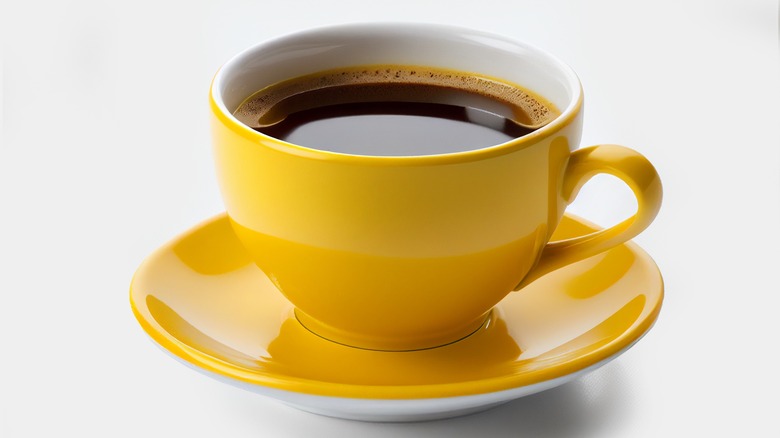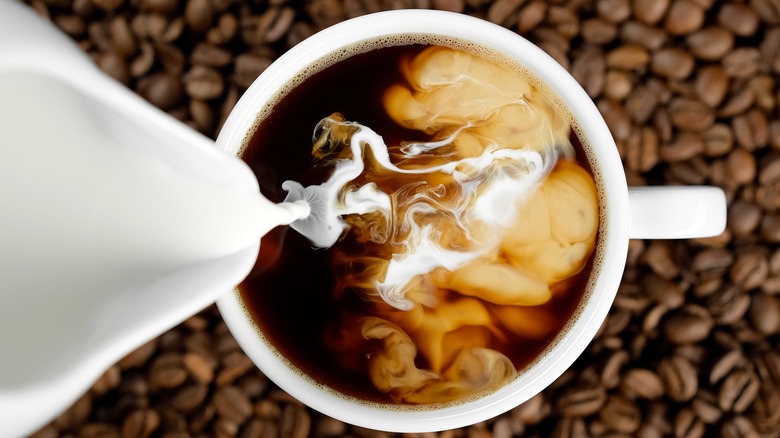Why Coffee Tastes So Much Worse At Room Temperature
A steaming cup of coffee can make any morning better, but sometimes you just can't finish it while it's hot. Like those mornings when you're late to work and rush out the door with mug in hand, but barely take a sip by the time you reach the office. When you finally do try to enjoy it, you find your beverage has gone lukewarm. Worse than the unpleasant temperature, however, is the way the coffee has suddenly transformed into a bitter, acidic mess.
What happened? Time was the culprit. It turns out time is a major detail that can ruin everything from your favorite Starbucks flavored latte to that fancy pour-over you made. As soon as a hot cup of coffee is brewed, it begins undergoing a chemical reaction that compromises its flavor and aroma. And the longer coffee sits out — going from piping hot to room temperature — the more its flavor will degrade.
The science of lukewarm coffee
Coffee gets its wonderful aroma from an oily organic compound called 2-Furfurylthiol. The longer coffee beans are stored, the more this compound begins to degrade (this is why fresh beans smell stronger than older ones). And, when the beans are brewed, this reaction happens even faster.
2-Furfurylthiol interacts with other compounds found in brewed coffee like hydroxydroquinone. The longer coffee sits out without being chilled, the more these compounds bind together. This masks 2-Furfurylthiol and inhibits the aroma. And, as it turns out, aroma is more important to flavor than we might think. The pleasant smell of coffee is part of why our palates don't find coffee excessively bitter. Take the aroma away, and the bitter flavors come to the front.
Coffee also becomes more acidic as it cools down. Compounds called lactones turn into carboxylic and chlorogenic acid when this happens. This brings in an unpleasant, sour taste that will throw the flavor further out of balance.
All of this might leave you wondering: If this happens to coffee when it cools down, why does iced coffee or cold brew always taste great? When you make cold brew, you actually never heat up the coffee grounds, meaning this chemical process never gets started. Coffee that has been brewed hot and then iced is also chilled quickly enough that it halts the process from continuing.
What to do to salvage lukewarm coffee
If you have a lukewarm cup of coffee on your hands, you don't necessarily need to dump it down the drain. Reheating it can be beneficial: It won't reverse the chemical reactions, but it can still make it taste more pleasant. If you're accustomed to drinking warm coffee, even a compromised cup will sit on the palette better when it isn't lukewarm. Just don't let it get too hot: Reheating coffee past 140 degrees Fahrenheit will damage the flavor even more. If the coffee reheats to a higher temperature, crucial aromatic and flavorful compounds will begin to evaporate.
Another option is to pour your lukewarm coffee over ice. Again, this won't reverse the chemical process, but it will make the unwanted taste less apparent. This is because flavors become less intense when food is colder since our palate has a tougher time engaging with our receptors. For example, an ice-cold bowl of ice cream might taste great, but as it warms up and melts it will become cloyingly sweet. In the same way, if you cool down your coffee, the adverse flavors will become muted.
If you don't want to do either, you still shouldn't throw out your coffee. Instead, save it and repurpose it for a fun sauce or salad dressing.



